formerly eScholarship Editions


|
|
|
|
Your search for
Public
in rights
'Medicine' in subject
found 27 book(s). | Modify Search | Displaying 1 - 20 of 27 book(s) | |
| 1. | 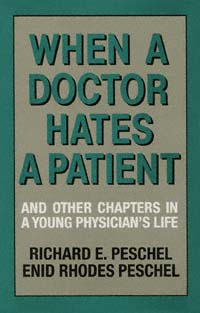 | Title: When a doctor hates a patient, and other chapters in a young physician's life Author: Peschel, Richard E Published: University of California Press, 1988 Subjects: Medicine | Science Similar Items |
| 2. | 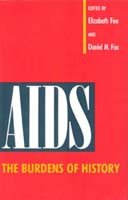 | Title: AIDS: the burdens of history Author: Fee, Elizabeth Published: University of California Press, 1988 Subjects: Medicine | Science Publisher's Description: The AIDS epidemic has posed more urgent historical questions than any other disease of modern times. How have societies responded to epidemics in the past? Why did the disease emerge when and where it did? How has it spread among members of particular groups? And how will the past affect the future - in particular, what does the history of medical science and public health tell us about our ability to control the epidemic and eventually to cure the disease?Historical methods of inquiry change, and people who use these methods often disagree on theory and practice. Indeed, the contributors to this volume hold a variety of opinions on controversial historiographic issues. But they share three important principles: cautious adherence to the "social constructionist" view of past and present; profound skepticism about historicism's idea of progress; and wariness about "presentism," the distortion of the past by seeing it only from the point of view of the present.Each of the twelve essays addresses an aspect of the burdens of history during the AIDS epidemic. By "burdens" is meant the inescapable significance of events in the past for the present. All of these events are related in some way to the current epidemic and can help clarify the complex social and cultural responses to the crisis of AIDS.This collection illuminates present concerns directly and forcefully without sacrificing attention to historical detail and to the differences between past and present situations. It reminds us that many of the issues now being debated - quarantine, exclusion, public needs and private rights - have their parallels in the past. This will be an important book for social historians and general readers as well as for historians of medicine. [brief] Similar Items |
| 3. | 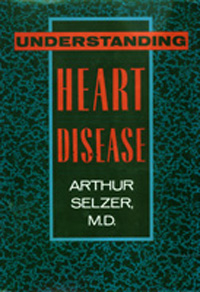 | Title: Understanding heart disease Author: Selzer, Arthur Published: University of California Press, 1992 Subjects: Medicine | Science Publisher's Description: Diseases of the heart are the leading cause of death in the Western world. Health professionals and the general public alike eagerly watch advances in the prevention, diagnosis, and treatment of heart disease. Yet the more spectacular aspects of medical progress in the field are often reported prematurely and their potential benefits exaggerated.Written in clear, accessible language, this book presents an authoritative and balanced picture of how heart diseases are recognized and managed. From his many years of experience, Dr. Selzer believes a well-informed patient can cooperate more successfully with a physician, and his book includes information vital to anyone confronting heart problems and cardiac emergencies. [brief] Similar Items |
| 4. | 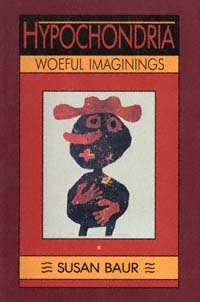 | Title: Hypochondria: woeful imaginatings Author: Baur, Susan Published: University of California Press, 1989 Subjects: Medicine | Science Publisher's Description: Writing with grace, humor, and an expert's eye for revealing detail, Susan Baur illuminates the processes by which hypochondriacs come to adopt and maintain illness as a way of life. Similar Items |
| 5. | 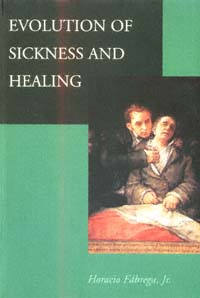 | Title: Evolution of sickness and healing Author: Fabrega, Horacio Published: University of California Press, 1997 Subjects: Medicine | Medical Anthropology Publisher's Description: Evolution of Sickness and Healing is a theoretical work on the grand scale, an original synthesis of many disciplines in social studies of medicine. Looking at human sickness and healing through the lens of evolutionary theory, Horacio Fàbrega, Jr. presents not only the vulnerability to disease and injury but also the need to show and communicate sickness and to seek and provide healing as innate biological traits grounded in evolution. This linking of sickness and healing, as inseparable facets of a unique human adaptation developed during the evolution of the hominid line, offers a new vantage point from which to examine the institution of medicine.To show how this complex, integrated adaptation for sickness and healing lies at the root of medicine, and how it is expressed culturally in relation to the changing historical contingencies of human societies, Fàbrega traces the characteristics of sickness and healing through the early and later stages of social evolution. Besides offering a new conceptual structure and a methodology for analyzing medicine in evolutionary terms, he shows the relevance of this approach and its implications for the social sciences and for medical policy. Health scientists and medical practitioners, along with medical historians, economists, anthropologists, and sociologists, now have the opportunity to consider every essential aspect of medicine within an integrated framework. [brief] Similar Items |
| 6. | 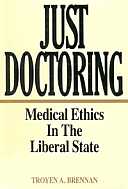 | Title: Just doctoring: medical ethics in the liberal state Author: Brennan, Troyen A Published: University of California Press, 1991 Subjects: Philosophy | Ethics | Medicine Publisher's Description: Just Doctoring draws the doctor-patient relationship out of the consulting room and into the middle of the legal and political arenas where it more and more frequently appears. Traditionally, medical ethics has focused on the isolated relationship of physician to patient in a setting that has left the physician virtually untouched by market constraints or government regulation. Arguing that changes in health care institutions and legal attention to patient rights have made conventional approaches obsolete, Troyen Brennan points the way to a new, more aware and engaged medical ethics.The medical profession is no longer isolated, even theoretically, from the liberal, market-dominated state. Old ideas of physician beneficence and altruism must make way for a justice-based medical ethics, assuming a relationship between equals more compatible with liberal political philosophy. Brennan offers clinical examples of many of today's most challenging medical problems - from informed consent to care rationing and the repercussions of the HIV epidemic - and gives his recommendation for a new ethical perspective. This lively and controversial plea for a rethinking of medical ethics goes right to the heart of medical care at the end of the twentieth century. [brief] Similar Items |
| 7. | 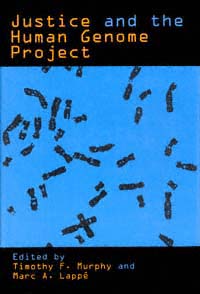 | Title: Justice and the human genome project Author: Murphy, Timothy F 1955- Published: University of California Press, 1994 Subjects: Philosophy | Ethics | Biology | Medicine Publisher's Description: The Human Genome Project is an expensive, ambitious, and controversial attempt to locate and map every one of the approximately 100,000 genes in the human body. If it works, and we are able, for instance, to identify markers for genetic diseases long before they develop, who will have the right to obtain such information? What will be the consequences for health care, health insurance, employability, and research priorities? And, more broadly, how will attitudes toward human differences be affected, morally and socially, by the setting of a genetic "standard"?The compatibility of individual rights and genetic fairness is challenged by the technological possibilities of the future, making it difficult to create an agenda for a "just genetics." Beginning with an account of the utopian dreams and authoritarian tendencies of historical eugenics movements, this book's nine essays probe the potential social uses and abuses of detailed genetic information. Lucid and wide-ranging, these contributions will provoke discussion among bioethicists, legal scholars, and policy makers. [brief] Similar Items |
| 8. | 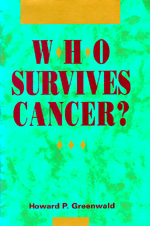 | Title: Who survives cancer? Author: Greenwald, Howard P Published: University of California Press, 1992 Subjects: Sociology | Environmental Studies | Medicine Publisher's Description: FACT OR FICTION? *A white male earning over $35,000 a year has a better chance of surviving most types of cancer than an unemployed African-American male.*Psychological factors predispose people to contracting cancer and improved emotional health promotes recovery.*Early detection is useless in curing cancer.*Experimental, not conventional, treatments offer the most benefits and longer survival rates to cancer patients.*A scientific breakthrough of practical and immediate significance in cancer treatment is imminent.*Cancer prevention is ineffective in many areas and campaigns will probably never achieve a reduction of cancer mortality approaching 50 percent.*Health Maintenance Organizations (HMOs) increase survival chances for most cancer patients.Howard Greenwald takes an incisive new look at how class, race, sex, psychological state, type of health care and available treatments affect one's chance of surviving cancer. Drawing on an original ten-year survival study of cancer patients, he synthesizes medical, epidemiological, and psychosocial research in a uniquely interdisciplinary and eye-opening approach to the question of who survives cancer and why.Scientists, health care professionals, philanthropists, government agencies, and ordinary people all agree that significant resources must be allocated to fight this dreaded disease. But what is the most effective way to do it? Greenwald argues that our priorities have been misplaced and calls for a fundamental rethinking of the way the American medical establishment deals with the disease. He asserts that the emphasis on prevention and experimental therapy has only limited value, whereas the availability of conventional medical care is very important in influencing cancer survival. Class and race become strikingly significant in predicting who has access to health care and can therefore obtain medical treatment in a timely, effective manner. Greenwald counters the popular notion that personality and psychological factors strongly affect survival, and he underscores the importance of early detection. His research shows that Health Maintenance Organizations, while sometimes prone to delays, offer low-income patients a better chance of ultimate survival. Greenwald pleads for immediate attention to the inadequacies and inequalities in our health care delivery system that deter patients from seeking regular medical care.Instead of focusing on research and the hope for a breakthrough cure, Greenwald urges renewed emphasis on ensuring available health care to all Americans. In its challenge to the thrust of much biomedical research and its critique of contemporary American health care, as well as in its fresh and often counterintuitive look at cancer survival, Who Survives Cancer? is invaluable for policymakers, health care professionals, and anyone who has survived or been touched by cancer. [brief] Similar Items |
| 9. | 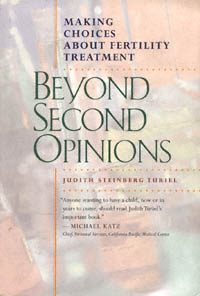 | Title: Beyond second opinions: making choices about fertility treatment Author: Turiel, Judith Steinberg 1948- Published: University of California Press, 1998 Subjects: Science | Sociology | Gender Studies | Medicine Publisher's Description: Beyond Second Opinions is both an exposé of the risks, errors, and distortions surrounding fertility medicine and an authoritative guide for people seeking treatment. Accessible, comprehensive, and extremely well-informed, this book takes the reader beyond hype to the hard data on diagnoses and treatments. Judith Steinberg Turiel, a consumer health activist and herself a veteran of fertility treatments, uses the most up-to-date medical literature to shed new light on difficult decisions patients face today and on reproductive questions society must begin to address now. Those who are seeking a more balanced perspective to help them make better, more informed decisions will find a wealth of information about current reproductive interventions - from simple fertility pills to dazzling experimental options - as well as a discussion of the non-medical forces (economic and political) that shape an individual's treatment choices and reproductive outcomes. Despite quantities of information showered upon patients, they remain woefully misinformed; some fertility treatments may actually reduce chances for a successful pregnancy and threaten a patient's health. Turiel looks beyond surface claims to the real information, often uncovering counterintuitive findings and sometimes scandalous revelations. She exposes a realm of unregulated expansion, unscientific experimentation, and recent scandal over stolen embryos. Weaving together first-hand accounts, compelling stories, a range of scientific information, and lively anecdotes, Turiel addresses the persistent gulfs that separate medical professionals and health care consumers. In the process she arms laypeople with what they might not learn about infertility practices from doctors, patient education brochures, and the newspaper. [brief] Similar Items |
| 10. | 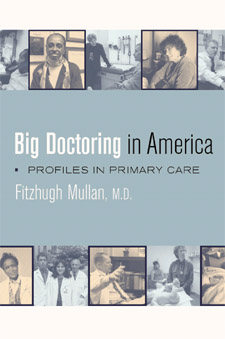 | Title: Big doctoring in America: profiles in primary care Author: Mullan, Fitzhugh Published: University of California Press, 2002 Subjects: Medicine | Health Care | Sociology Publisher's Description: The general practitioner was once America's doctor. The GP delivered babies, removed gallbladders, and sat by the bedsides of the dying. But as the twentieth century progressed, the pattern of medical care in the United States changed dramatically. By the 1960s, the GP was almost extinct. The later part of the twentieth century, however, saw a rebirth of the idea of the GP in the form of primary care practitioners. In this engrossing collection of oral histories and provocative essays about the past and future of generalism in health care, Fitzhugh Mullan - a pediatrician, writer, and historian - argues that primary care is a fascinating, important, and still endangered calling. In conveying the personal voices of primary care practitioners, Mullan sheds light on the political and economic contradictions that confront American medicine. Mullan interviewed dozens of primary care practitioners - family physicians, internists, pediatricians, nurse practitioners, and physician assistants - asking them about their lives and their work. He explains how, during the last forty years, the primary care movement has emerged built on the principles of "big doctoring"--coordinated, comprehensive care over time. This book is essential reading for understanding core issues of the current health care dilemma. As our country struggles with managed care, market reforms, and cost containment strategies in medicine, Big Doctoring in America provides an engrossing and illuminating look at those in the trenches of the profession. [brief] Similar Items |
| 11. |  | Title: Old, alone, and neglected: care of the aged in the United States and Scotland Author: Kayser-Jones, Jeanie Schmit Published: University of California Press, 1990 Subjects: Anthropology | Aging | Medical Anthropology | Medicine Publisher's Description: As the median age of the population increases, the care and housing of the elderly in the U.S. are of increasing concern. Jeanie Kayser-Jones compares a typical private institution in the U.S. with a government-owned home in Scotland.Her analysis compels attention to the systematic abuse of the inst . . . [more] Similar Items |
| 12. | 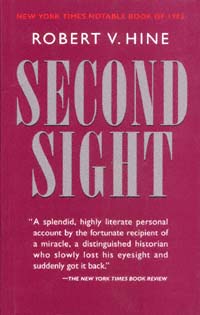 | Title: Second sight Author: Hine, Robert V 1921- Published: University of California Press, 1997 Subjects: Autobiographies and Biographies | Medicine Publisher's Description: He knew he was going blind. Yet he finished graduate school, became a history professor, and wrote books about the American West. Then, nearly fifty, Robert Hine lost his vision completely. Fifteen years later, a risky eye operation restored partial vision, returning Hine to the world of the sighted. "The trauma seemed instructive enough" for him to begin a journal.That journal is the heart of Second Sight, a sensitively written account of Hine's journey into darkness and out again. The first parts are told simply, with little anguish. The emotion comes when sight returns; like a child he discovers the world anew - the intensity of colors, the sadness of faces grown older, the renewed excitement of sex and the body.With the understanding and insights that come from living on both sides of the divide, Hine ponders the meaning of blindness. His search is enriched by a discourse with other blind writers, humorist James Thurber, novelist Eleanor Clark, poet Jorge Luis Borges, among others. With them he shares thoughts on the acceptance and advantages of blindness, resentment of the blind, the reluctance with sex, and the psychological depression that often follows the recovery of sight.Hine's blindness was the altered state in which to learn and live, and his deliverance from blindness the spur to seek and share its lessons. What he found makes a moving story that embraces all of us - those who can see and those who cannot. [brief] Similar Items |
| 13. |  | Title: The cigarette papers Author: Glantz, Stanton A Published: University of California Press, 1998 Subjects: Politics | Medicine | Public Policy | Law | United States History Publisher's Description: Around-the-clock tobacco talks, multibillion-dollar lawsuits against the major cigarette companies, and legislative wrangling over how much to tax a pack of cigarettes - these are some of the most recent episodes in the war against the tobacco companies. The Cigarette Papers shows what started it all: revelations that tobacco companies had long known the grave dangers of smoking, and did nothing about it.In May 1994 a box containing 4,000 pages of internal tobacco industry documents arrived at the office of Professor Stanton Glantz at the University of California, San Francisco. The anonymous source of these "cigarette papers" was identified only as "Mr. Butts." These documents provide a shocking inside account of the activities of one tobacco company, Brown & Williamson, over more than thirty years. Quoting extensively from the documents themselves and analyzing what they reveal, The Cigarette Papers shows what the tobacco companies have known and galvanizes us to take action. [brief] Similar Items |
| 14. | 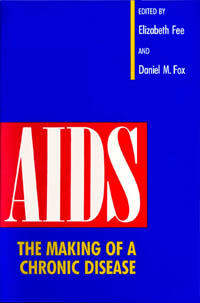 | Title: AIDS: the making of a chronic disease Author: Fee, Elizabeth Published: University of California Press, 1991 Subjects: History | Medicine | United States History | Sociology Publisher's Description: When AIDS was first recognized in 1981, most experts believed that it was a plague, a virulent unexpected disease. They thought AIDS, as a plague, would resemble the great epidemics of the past: it would be devastating but would soon subside, perhaps never to return. By the middle 1980s, however, it became increasingly clear that AIDS was a chronic infection, not a classic plague.In this follow-up to AIDS: The Burdens of History , editors Elizabeth Fee and Daniel M. Fox present essays that describe how AIDS has come to be regarded as a chronic disease. Representing diverse fields and professions, the twenty-three contributors to this work use historical methods to analyze politics and public policy, human rights issues, and the changing populations with HIV infection. They examine the federal government's testing of drugs for cancer and HIV, and show how the policy makers' choice of a specific historical model (chronic disease versus plague) affected their decisions. A powerful photo essay reveals the strengths of women from various backgrounds and lifestyles who are coping with HIV. A sensitive account of the complex relationships of the gay community to AIDS is included. Finally, several contributors provide a sampling of international perspectives on the impact of AIDS in other nations. [brief] Similar Items |
| 15. | 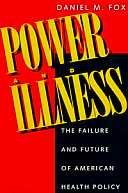 | Title: Power and illness: the failure and future of American health policy Author: Fox, Daniel M Published: University of California Press, 1993 Subjects: Sociology | Medicine | History | American Studies | United States History Publisher's Description: During most of this century, American health policy has emphasized caring for acute conditions rather than preventing and managing chronic illness - even though chronic illness has caused most sickness and death since the 1920s. In this provocative and wide-ranging book, Daniel Fox explains why this has been so and offers a forceful argument for fundamental change in national health care priorities.Fox discusses how ideas about illness and health care, as well as the power of special interest groups, have shaped the ways in which Americans have treated illness. Those who make health policy decisions have increased support for hospitals, physicians, and medical research, believing that people then would become healthier. This position, implemented at considerable cost, has not adequately taken into account the growing burden of chronic disabling illness. While decision makers may have defined chronic disease as a high priority in research, they have not given it such a priority in the financing of health services.The increasing burden of chronic illness is critical. Fox suggests ways to solve this problem without increasing the already high cost of health care - but he does not underestimate the difficulties in such a strategy. Advocating the redistribution of resources within hospital and medical services, he targets those that are redundant or marginally effective.There could be no more timely subject today than American health care. And Daniel Fox is uniquely able to address its problems. A historian of medicine, with knowledge of how hospitals and physicians behave and how health policy is made at government levels, he has extensively researched published and unpublished documents on health care. What he proposes could profoundly affect all Americans. [brief] Similar Items |
| 16. | 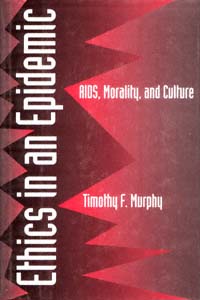 | Title: Ethics in an epidemic: AIDS, morality, and culture Author: Murphy, Timothy F 1955- Published: University of California Press, 1994 Subjects: Philosophy | Sociology | Ethics | Medicine | Social Problems Publisher's Description: AIDS strikes most heavily at those already marginalized by conventional society. With no immediate prospect of vaccination or cure, how can liberty, dignity, and reasoned hope be preserved in the shadow of an epidemic? In this humane and graceful book, philosopher Timothy Murphy offers insight into our attempts - popular and academic, American and non-American, scientific and political - to make moral sense of pain.Murphy addresses the complex moral questions raised by AIDS for health-care workers, politicians, policy makers, and even people with AIDS themselves. He ranges widely, analyzing contrasting visions of the origin and the future of the epidemic, the moral and political functions of obituaries, the uncertain value of celebrity involvement in anti-AIDS education, the functional uses of AIDS in the discourse of presidential campaigns, the exclusionary function of HIV testing for immigrants, the priority given to AIDS on the national health agenda, and the hypnotic publicity given to "innocent" victims.Murphy's discussions of the many social and political confusions about AIDS are unified by his attempt to articulate the moral assumptions framing our interpretations of the epidemic. By understanding those assumptions, we will be in a better position to resist self-serving and invidious moralizing, reckless political response, and social censure of the sick and the dying. [brief] Similar Items |
| 17. |  | Title: Hysteria beyond Freud Author: Gilman, Sander L Published: University of California Press, 1993 Subjects: History | Literature | Women's Studies | Psychiatry | Medicine Publisher's Description: "She's hysterical." For centuries, the term "hysteria" has been used by physicians and laymen alike to diagnose and dismiss the extreme emotionality and mysterious physical disorders presumed to bedevil others - especially women. How has this medical concept assumed its power? What cultural purposes does it serve? Why do different centuries and different circumstances produce different kinds of hysteria?These are among the questions pursued in this absorbing, erudite reevaluation of the history of hysteria. The widely respected authors draw upon the insights of the new social and cultural history, rather than Freudian psychoanalysis, to examine the ways in which hysteria has been conceived by doctors and patients, writers and artists, in Europe and North America, from antiquity to the early years of the twentieth century. In so doing, they show that a history of hysteria is a history of how we understand the mind. [brief] Similar Items |
| 18. | 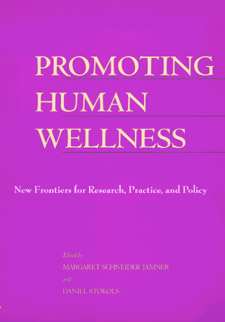 | Title: Promoting human wellness: new frontiers for research, practice, and policy Author: Jamner, Margaret Schneider Published: University of California Press, 2001 Subjects: Medicine | Public Policy | Anthropology | Aging | Education Publisher's Description: This book is a state-of-the-art educational resource on the latest research and public-policy developments in the fields of wellness promotion and disease prevention. Based on award-winning lectures by University of California faculty on nine campuses as part of the Wellness Lectures Program jointly funded by The California Wellness Foundation, Health Net, and the University of California, the volume aims to widen the scope of health care research and policy to promote wellness rather than focus on illness and disease, and to incorporate proactive, interdisciplinary approaches to health care. The volume also contains chapters by distinguished scholars inthe fields of wellness promotion and disease prevention. Many of these articles fall outside the scope of what we conventionally call health promotion, bringing new perspectives to research and policy possibilities. Promoting Human Wellness is organized around core themes such as the importance of disease prevention programs that address multiple health risks, the link between poverty and minority status and disease susceptibility, and the challenge of evaluating health benefits and cost-effectiveness. The articles discuss such timely issues as genetic determinism as a paradigm in wellness promotion, adolescent health promotion and teen pregnancy prevention strategies, racial differences in cancer epidemiology, the California smokers' helpline, strategies for reducing youth violence, HIV/AIDS prevention, domestic violence education and prevention srategies, and the future of women's health research. Presented within the framework of social ecology, several of the chapters in this volume address new ideas and approaches in the wellness field that are only now beginning to be understood such as the social construction of variables including race, class, and gender. Promoting Human Wellness will be essential reading for health practitioners, policymakers, and others seeking to expand the ways we define and achieve health. Keywords: Public health, community health, medicine, nursing, social welfare, health education, health psychology, social ecology, public policy, aging, health promotion. [brief] Similar Items |
| 19. | 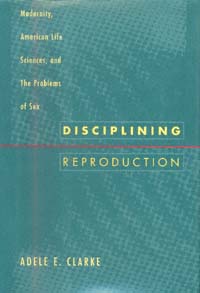 | Title: Disciplining reproduction: modernity, American life sciences, and "the problems of sex" Author: Clarke, Adele Published: University of California Press, 1998 Subjects: Sociology | Medical Anthropology | Medicine | American Studies | Gender Studies Publisher's Description: Reproductive issues from sex and contraception to abortion and cloning have been controversial for centuries, and scientists who attempted to turn the study of reproduction into a discipline faced an uphill struggle. Adele Clarke's engrossing story of the search for reproductive knowledge across the twentieth century is colorful and fraught with conflict.Modern scientific study of reproduction, human and animal, began in the United States in an overlapping triad of fields: biology, medicine, and agriculture. Clarke traces the complicated paths through which physiological approaches to reproduction led to endocrinological approaches, creating along the way new technoscientific products from contraceptives to hormone therapies to new modes of assisted conception - for both humans and animals. She focuses on the changing relations and often uneasy collaborations among scientists and the key social worlds most interested in their work - major philanthropists and a wide array of feminist and medical birth control and eugenics advocates - and recounts vividly how the reproductive sciences slowly acquired standing.By the 1960s, reproduction was disciplined, and the young and contested scientific enterprise proved remarkably successful at attracting private funding and support. But the controversies continue as women - the targeted consumers - create their own reproductive agendas around the world. Elucidating the deep cultural tensions that have permeated reproductive topics historically and in the present, Disciplining Reproduction gets to the heart of the twentieth century's drive to rationalize reproduction, human and nonhuman, in order to control life itself. [brief] Similar Items |
| 20. | 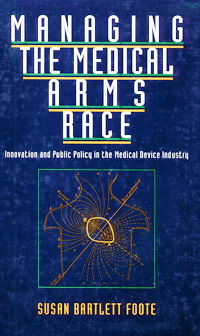 | Title: Managing the medical arms race: public policy and medical device innovation Author: Foote, Susan Bartlett Published: University of California Press, 1992 Subjects: Politics | Medicine | Public Policy | Economics and Business Publisher's Description: The allure of medical innovation is powerful - it holds out the promise of perfect health, the end of pain, the deferral of death. Our insatiable appetite for costly new technologies, fed by a profusion of innovations and the profits they generate, has led to what has been dubbed the medical arms race. During the last several decades government has been called upon to manage the escalation of this race.Foote has written the first comprehensive examination of the profound influence of government policies on medical innovation. She explains how these policies have proliferated to affect every stage of the innovative process in medical device technology - from the first research idea to the patient's bedside. Drawing on case studies of technologies as diverse as lasers, cardiac pacemakers, CT scanners, and IUDs, she traces the interaction between the industry and government institutions, including the National Institutes of Health, the FDA, and the Medicare and Medicaid programs.Public policies during the 1950s and 1960s, Foote discovers, tended to promote innovation, while the regulation and cost controls of the 1970s and 1980s began to inhibit it. For the 1990s and beyond she proposes incremental policy improvements that will rationalize and streamline government intervention. She cautions that we must recognize the limits of medical technology and public policy to cure all ills.Medical innovation is a crucial part of health care reform, a subject of increasing complexity and controversy. Written clearly and accessibly, Managing the Medical Arms Race is an invaluable source for medical, industry, and policy professionals, but it also has much to say to anybody concerned with how we as a society choose to take care of our health. [brief] Similar Items |